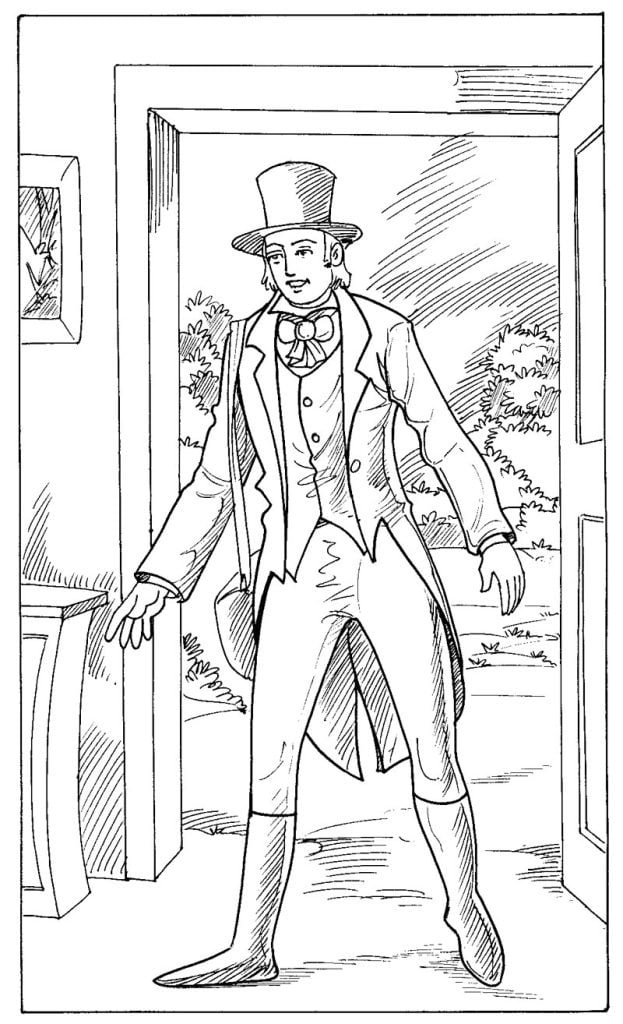Chapter 11
Emma could not forgive her; but as neither provocation nor resentment were discerned by Mr. Knightley, who had been of the party, and had seen only proper attention and pleasing behaviour on each side, he was expressing the next morning, being at Hartfield again on business with Mr. Woodhouse, his approbation of the whole; not so openly as he might have done had her father been out of the room, but speaking plain enough to be very intelligible to Emma. He had been used to think her unjust to Jane, and had now great pleasure in marking an improvement.
“A very pleasant evening,” he began, as soon as Mr. Woodhouse had been talked into what was necessary, told that he understood, and the papers swept away, “particularly pleasant. You and Miss Fairfax gave us some very good music. I do not know a more luxurious state, sir, than sitting at one’s ease to be entertained a whole evening by two such young women; sometimes with music and sometimes with conversation. I am sure Miss Fairfax must have found the evening pleasant, Emma. You left nothing undone. I was glad you made her play so much, for having no instrument at her grandmother’s, it must have been a real indulgence.”
“I am happy you approved,” said Emma, smiling, “but I hope I am not often deficient in what is due to guests at Hartfield.”
“No, my dear,” said her father instantly, “that I am sure you are not. There is nobody half so attentive and civil as you are. If any thing, you are too attentive. The muffin last night—if it had been handed round once—I think it would have been enough.”
“No,” said Mr. Knightley, nearly at the same time, “you are not often deficient; not often deficient either in manner or comprehension. I think you understand me, therefore.”
An arch look expressed—“I understand you well enough,” but she said only, “Miss Fairfax is reserved.”
“I always told you she was—a little; but you will soon overcome all that part of her reserve which ought to be overcome, all that has its foundation in diffidence. What arises from discretion must be honoured.”
“You think her diffident. I do not see it.”
“My dear Emma,” said he, moving from his chair into one close by her, “you are not going to tell me, I hope, that you had not a pleasant evening.”
“Oh! no; I was pleased with my own perseverance in asking questions; and amused to think how little information I obtained.”
“I am disappointed,” was his only answer.
“I hope every body had a pleasant evening,” said Mr. Woodhouse, in his quiet way. “I had. Once, I felt the fire rather too much; but then I moved back my chair a little, a very little, and it did not disturb me. Miss Bates was very chatty and good-humoured, as she always is, though she speaks rather too quick. However, she is very agreeable, and Mrs. Bates too, in a different way. I like old friends; and Miss Jane Fairfax is a very pretty sort of young lady, a very pretty and a very well-behaved young lady indeed. She must have found the evening agreeable, Mr. Knightley, because she had Emma.”
Human nature is so well disposed towards those who are in interesting situations, that a young person, who either marries or dies, is sure of being kindly spoken of.
A week had not passed since Miss Hawkins’s name was first mentioned in Highbury, before she was, by some means or other, discovered to have every recommendation of person and mind; to be handsome, elegant, highly accomplished, and perfectly amiable: and when Mr. Elton himself arrived to triumph in his happy prospects, and circulate the fame of her merits, there was very little more for him to do, than to tell her Christian name, and say whose music she principally played.

Mr. Elton returned, a very happy man. He had gone away rejected and mortified—disappointed in a very sanguine hope, after a series of what appeared to him strong encouragement; and not only losing the right lady, but finding himself debased to the level of a very wrong one. He had gone away deeply offended; he came back engaged to another and to another as superior, of course, to the first, as under such circumstances what is gained always is to what is lost. He came back gay and self-satisfied, eager and busy, caring nothing for Miss Woodhouse, and defying Miss Smith.
The charming Augusta Hawkins, in addition to all the usual advantages of perfect beauty and merit, was in possession of an independent fortune, of so many thousands as would always be called ten; a point of some dignity, as well as some convenience: the story told well; he had not thrown himself away. He had gained her with such delightful rapidity; the first hour of introduction had been so very soon followed by distinguishing notice; the history which he had to give Mrs. Cole of the rise and progress of the affair was so glorious—the steps so quick, rom the accidental rencontre, to the dinner at Mr. Green’s, and the party at Mrs. Brown’s—smiles and blushes rising in importance— with consciousness and agitation richly scattered—the lady had been so easily impressed—so sweetly disposed—had in short, to use a most intelligible phrase, been so very ready to have him, that vanity and prudence were equally contented.
